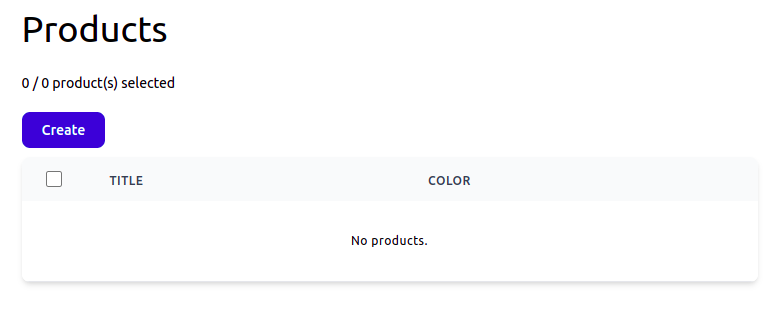Osm Admin: Notification Tables
2 years ago ∙ 2 minutes read
Yesterday, indexers started listening to query inserted, updated and deleted notifications and creating records in notification tables.
Now, saving a product complains:
Table 'admin2.zi9__products__inserts' doesn't existFair enough. Let's create it.
- Creating Notification Tables
- Segmentation Fault During
migrate:schema - Notification Table Names
- Styling Empty Grid
Creating Notification Tables
Q. When Should It Be Created?
A notification table should be created after creating the main table - products, as I'd want to CASCADE DELETE a product insert notification if the product is deleted.
A notification table should be created after creating the indexer status record, as the indexer ID is used in the notification table name.
To sum up, it should be created when the source notification table is created.
It seems that altering database schema after class schema changes seems to be an important and interesting task. I'll devote the next iteration to solving this challenge. Till then, I'll recreate the database after any class schema change.
In the Table class, I added notification table creation:
public function create(): void
{
...
foreach ($this->listeners as $listener) {
$listener->createNotificationTables($this);
}
}The Indexer class does the heavy-lifting:
public function createNotificationTables(Table $source): void {
$listensTo = $this->listens_to[$source->name];
if ($inserted = $listensTo[Query::INSERTED] ?? null) {
$this->createNotificationTable($source, $inserted, cascade: true);
}
if (($updated = $listensTo[Query::UPDATED] ?? null) &&
$updated != $inserted)
{
$this->createNotificationTable($source, $updated, cascade: true);
}
if ($deleted = $listensTo[Query::DELETED] ?? null) {
$this->createNotificationTable($source, $deleted, cascade: true);
}
}
protected function createNotificationTable(Table $source, string $suffix,
bool $cascade = false): void
{
$this->db->create($this->getNotificationTableName($source, $suffix),
function(Blueprint $table) use ($source, $cascade) {
$table->integer('id')->unsigned()->unique();
if ($cascade) {
$table->foreign('id')
->references('id')
->on($source->table_name)
->onDelete('cascade');
}
}
);
}I marked the id column as unique(). It won't work well with updates, as multiple updates may happen in the same object until it's processed by the indexer. I'll handle that later.
Segmentation Fault During migrate:schema
While running osm migrate:schema console command, I get:
Segmentation fault (core dumped)It's very frustrating. The only way to debug this kind of error is setting breakpoints here and there and eventually find out the line that causes the error.
The problem was in search index creation. id field is added there anyway, and id property tried to add id field one more time. So I added a check for that:
public function create(): void
{
...
$this->search->create($this->table_name, function(SearchBlueprint $index) {
foreach ($this->properties as $property) {
if ($property->name === 'id') {
continue;
}
...
}
});
...
}Notification Table Names
I changed notification table naming as follows:
protected function getNotificationTableName(Table $table, string $suffix)
: string
{
return "zi{$this->id}__{$table->table_name}__{$suffix}";
}This way, notification tables will appear after all "normal" tables in the database administration tool (I use Adminer).
Styling Empty Grid
While indexing doesn't work, I've noticed that the product grid is ugly when empty, so I styled it a bit:


